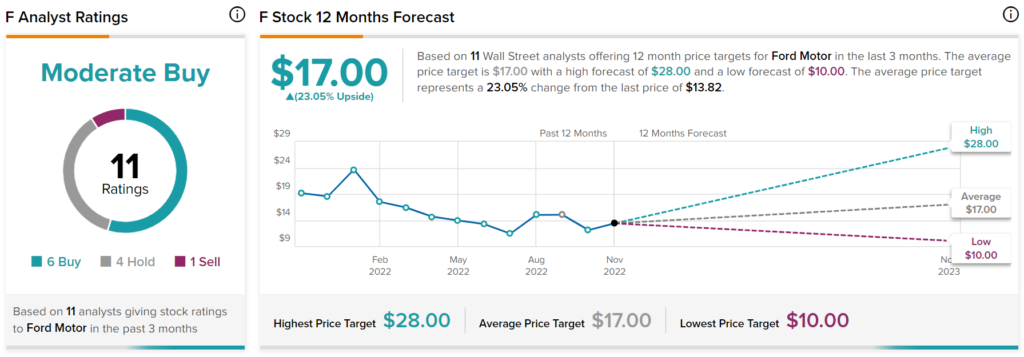Traditionally, the auto market has been a leading indicator of whether there’s a recession, but these are strange times. There’s no doubt that this is a challenging time for discretionary purchases, but automakers are showing signs of post-pandemic recovery. In this piece, we used TipRanks’ Comparison Tool to evaluate two automaker stocks: Ford Motor Company (F) and General Motors (GM). An analysis of these two reveals that they are neck and neck in the race for the future.

It’s too early to know which legacy automaker will win in the long run, but in the meantime, there are reasons to like both. It boils down to which factors are considered more important.
Ford Motor
On some financial metrics, Ford beats General Motors hands-down, but on others, GM is the one that dominates. Of course, electric vehicles are the future of the auto industry, so EV prowess is important. However, based on the many factors that will affect Ford’s share price going forward, a bullish view appears appropriate, depending on which are emphasized over the others.
As far as its strategy, Ford disbanded its self-driving vehicle division to focus more on EVs and other technologies that will become ubiquitous in the near term. Ford also continues to invest in its legacy vehicles while pushing forward into EVs. It expects at least 40% of its sales to be EVs by 2030.
Ford is a free cash flow machine, having already surpassed its full-year projection during the third quarter. As a result, the automaker boosted its free cash flow guidance to a range of $9.5 billion to $10 billion, up from the previous range of $5.5 billion to $6.5 billion.
Additionally, Ford sold 41,236 EVs during the first three quarters — almost twice as many as GM. Ford’s strategy has also enabled it to ramp production faster than GM to get more vehicles out to dealers.
However, the closure of the autonomous vehicle division caused a sizable write-down that triggered a third-quarter loss, and this year has been bumpy in terms of profitability.
With a P/E multiple of around 6.4 times and a healthy dividend yield of 3.24%, Ford looks cheap on a short and long-term basis.
What is the Price Target for Ford Stock?
Ford has a Moderate Buy consensus rating based on six Buys, four Holds, and one Sell assigned over the past three months. At $17, the average price target for Ford implies upside potential of 23.05%.

General Motors
GM beats Ford on other financial metrics and factors while facing many of the same challenges and long-term tailwinds. Thus, a bullish view also seems appropriate for General Motors, depending on which factors are emphasized.
While Ford has exited autonomous vehicles, GM is charging ahead by expanding its robo-taxi business in San Francisco. GM also aims to stop selling vehicles with internal combustion engines by 2035. GM prioritizes its luxury EVs with new batteries, although most of its sales are the older Bolt EVs.
On the plus side, GM’s balance sheet is better than Ford’s, although Ford’s isn’t terrible. GM also has a lot less debt than Ford, with debt-to-equity ratios of 165.5% and 308.3%, respectively. GM’s profit growth has also been more consistent.
However, GM’s dividend yield is minuscule, at 0.23%, and it has sold significantly fewer EVs than Ford year-to-date. Additionally, while Ford has focused on speed to market, GM has built its own EV technology, taking longer to push its EVs to the market. With a P/E of about 6.9 times, GM also looks cheap on a short and long-term basis.
What is the Price Target for GM stock?
General Motors has a Moderate Buy consensus rating based on eight Buys, five Holds, and two Sells assigned over the past three months. At $46.54, the average price target for GM stock implies upside potential of 17.13%.

Conclusion: Long-Term Bullish on F and GM Stocks
Recessions are never good for the auto industry, especially when inflation and high-interest rates are weighing on big-ticket purchases. However, over the long term, the future looks bright for both Ford and GM. A recent study from Bank of America Merrill Lynch suggested they could both overtake Tesla, each grabbing 15% of the EV market by 2025 as Tesla falls from 70% to 11%.
A bullish view was assigned to both Ford and GM because some investors will see Ford as the better choice, while others will find GM more attractive, depending on which factors are emphasized. However, as things stand now, either could win the EV race — or both could be successful.



















